- Home
- Cynthia Voigt
Mister Max: The Book of Lost Things: Mister Max 1
Mister Max: The Book of Lost Things: Mister Max 1 Read online
THIS IS A BORZOI BOOK PUBLISHED BY ALFRED A. KNOPF
This is a work of fiction. Names, characters, places, and incidents either are the product of the author’s imagination or are used fictitiously. Any resemblance to actual persons, living or dead, events, or locales is entirely coincidental.
Text copyright © 2013 by Cynthia Voigt
Jacket art and interior illustrations copyright © 2013 by Iacopo Bruno
All rights reserved. Published in the United States by Alfred A. Knopf, an imprint of Random House Children’s Books, a division of Random House, Inc., New York.
Knopf, Borzoi Books, and the colophon are registered trademarks of Random House, Inc.
Visit us on the Web! randomhouse.com/kids
Educators and librarians, for a variety of teaching tools, visit us at RHTeachersLibrarians.com
Library of Congress Cataloging-in-Publication Data
Voigt, Cynthia.
Mister Max : the book of lost things / by Cynthia Voigt;
illustrated by Iacopo Bruno. — 1st ed.
p. cm.
Summary: When Max’s parents leave the country without him, he must rely on his wits to get by, and before long he is running his own—rather unusual—business.
eISBN: 978-0-307-97683-3
[1. Self-reliance—Fiction. 2. Problem solving—Fiction.] I. Bruno, Iacopo, illustrator.
II. Title. III. Title: Book of lost things.
PZ7.V874Mi 2013 [Fic]—dc23 2012033823
Random House Children’s Books supports the First Amendment and celebrates the right to read.
v3.1
For MY Mister Max
CONTENTS
Cover
Title Page
Copyright
Dedication
Map
Epigraph
Prologue
1. In which a surprising invitation arrives and plans are made
2. In which Max loses his parents
3. In which Max and Grammie wonder what happened, and what to do about it
4. In which Max doesn’t want to get out of bed, Grammie is bossy, and Madame Olenka enters the scene
5. In which Madame Olenka returns with reinforcements, and Max seeks gainful employment
6. In which Max earns a princely sum
7. In which we meet Gabrielle Glompf, and Max acquires a lodger
8. In which Max is offered a job
9. The Lost Dog, Act I
10. The Lost Spoon, Act I
11. The Lost Dog, Act II, scene 1
12. The Lost Dog, Act II, scene 2
13. In which Max and Joachim discuss thorny topics, and Grammie has a strange encounter
14. The Lost Spoon, Act II
15. The Lost Spoon, Act III
16. In which the Long-ears reappear
17. In which Pia is irritating
18. In which Mister Max plies his trade, whatever that might be
19. In which Pia has her uses
20. The Lost Dog, Act III
21. In which Madame Olenka is dealt with
22. The Library Job, Act I
23. The Library Job, Act II
24. The Library Job, Act III
25. In which what was lost is—in a way—found
Excerpt from Mister Max: The Book of Secrets
About the Author
“All the world’s a stage.”
—William Shakespeare, As You Like It
PROLOGUE
On a bright Sunday morning in the early years of the last century, a bellhop from the Hotel Excelsior knocked at the front door of 5 Thieves Alley, the home of William and Mary Starling of the Starling Theatrical Company, and their son, Maximilian. The bellhop, wearing the traditional red uniform with stripes running the length of his trouser legs and with the traditional red cap perched on his head, put a small packet into the hand of the dark-haired, hawk-nosed man who opened the door and accepted the coin offered to him for his trouble. He walked briskly off, unaware of what he had started.
In which a surprising invitation arrives and plans are made
William Starling carried the packet back into the dining room, where his wife and son were seated. In those days, most families did their most ambitious cooking for the midday Sunday dinner, but the Starlings were theatrical, and you cannot give a good Sunday matinee on a full stomach. Therefore, Sunday breakfast was Mary’s showcase meal of the week, a matter of sweet rolls and fresh juice, sausages, bacon, and thick cheesy omelets. They ate these breakfasts at a table set with linen napkins, silver cutlery, and the good china. On Sunday mornings, the Starlings could enjoy a leisurely family meal. But when William came back into the dining room, he couldn’t contain his curiosity. He pushed his unfinished plate aside. From inside the packet, he pulled two long envelopes, one small, heavy red silk bag, and one thick sheet of paper covered with words arranged in lines as straight as soldiers on a battlefield. He read this letter through silently. When he had finished, he looked across the table to his wife and waited, watching her.
She waited, watching him.
Neither of them looked at Max, who had also stopped eating but did not speak. He knew better than to interrupt the drama they were creating.
William set the letter down on the table, pulled his plate close again, and picked up his fork.
Patient, silent, Mary watched, waiting, until at last she burst out laughing and said, “All right, William. I give up. I’ll ask, if you’re going to be so … so theatrical about it. What does the letter say?”
“It says,” her husband began, and filled his mouth with sausage. After he had chewed for an irritatingly long time, and swallowed, and savored the last of his orange juice, he said, in a voice that vibrated like a tuning fork, “It promises, my dearling, that a great adventure awaits us.”
“That’s unfortunate,” remarked Mary, with no more interest than if he had just told her she had toast crumbs on her chin. She rose from the table. William was not the only dramatist in the family. “Seeing that we have a full schedule of performances from now until”—she half turned in the doorway and paused, as if to think—“I believe the middle of September. With no time for adventures.”
“All right,” William said, “all right, Mary. You win. Come back, sit down, and lend me your ears.” When she had done as he asked, he announced, as if he were addressing a great crowd from a great height, “On this first day of April, the Starling Theatrical Company has received a letter from deepest India, a letter written by the Maharajah of Kashmir himself, in his own hand. ‘The most excellent and skillful William Starling’—I’m quoting now—‘and his most beautiful and talented wife’ … These are his exact words,” William Starling said, facing the letter outward and waving it gently, as if his wife and son could read moving script. He used his own voice to tell her, “We’ve been invited to spend several months, or more, in his raj. In India, Mary. We’ve never been to India. And what do you say to that, my most beautiful and talented wife?”
She answered slowly, “I say it’s very odd. Very odd indeed. What use can he have for us?”
“He wants us to create a theater company for him. Like in Elizabethan England, a troupe of actors to entertain his court and to travel among his villages, performing. He wants us to find people of talent and teach them how to act, and introduce them to plays, and show them how to produce a play. He says no other maharajah has his own theatrical company, and he’ll be the first, he’ll lead the way. Think of it, Mary.”
Only then did he pass the paper across the table to her. Max twisted in his chair so he could read it, too.
The letter was written on heavy, g
ilt-edged paper, embossed at the top with a spiky design, like a series of upside-down Vs of varying height crowding together, even overlapping. The Maharajah offered this opportunity to the Starling Theatrical Company because, he said, he had once seen their brilliant performance of a play, the name of which he couldn’t recall, in a great city, although he couldn’t be certain just which of the world’s great cities it had been. He had, however, remembered not only the name of the Company but also its home base, so indelible had been the impression made on him by the talented couple who were its primary actors. So that when he conceived the dream of having a theatrical company of his own, he resolved immediately to persuade them to come to his “most pleasing and welcoming country, with its most lovely landscapes.” He hoped they would be willing to help him undertake his “proud hope.” He was looking forward “most blissfully” to the honor of welcoming the Starlings into his “most humble palace.”
William Starling spread butter on a cinnamon roll and smiled at his wife, whose large, wide-set dark gray eyes danced with eagerness. “A palace, my dearling. We will live in a maharajah’s palace. Imagine it.” His own eyes, brown as chestnuts, glowed, and his smile lit the room.
Neither of them so much as glanced at Max.
“They’re actors,” Grammie often told him, as if that explained everything. She promised him, “When you’re older, it’ll be different.”
Like most librarians and former grade-school teachers, Grammie was proved right. After his eighth birthday, Max’s parents began to give him jobs in the theater—prompting actors during performances, keeping track of props, even sometimes appearing onstage if a child was needed as background for a scene. He missed many days of school, but he was smart enough to progress from year to year at the normal rate. After his tenth birthday, his parents sometimes took Max with them when they traveled. Then he was absent not only for rehearsals or after late performances, but also because he was on the road, visiting distant cities with the Starling Theatrical Company.
Max could understand why the other boys and the teachers liked him less and less each year. (You can’t know a lot of plays well, some of them written by William Shakespeare, without getting a good understanding of how and why people do what they do.) But he wouldn’t have changed his life for anything their friendship and approval had to offer. His parents were the most fascinating people he knew. He never tired of their performances, on the stage or out on a street or even in their own kitchen. Max didn’t want to be an actor, although he could carry off a minor role, given the right costume. He thought that, just as his eyes were a mixture of gray and black and brown that made a new, as yet unnamed and possibly unpleasant color, he himself was a mix of their two characters, and therefore different from both of them. And he knew that in their actorish way his parents cared about him, and enjoyed him, and respected him. “He’s growing up,” William Starling liked to say. “Grown up and grown tall in the bargain. After twelve years, a boy’s parents have done all they can. He’s ready to be independent! Does he look like independence material to you?” he would ask whoever happened to be present for this announcement—which he made for the first time at Max’s eighth birthday dinner. “Because he’s closing in on twelve. I hope he’s ready.”
Max had turned twelve the September before. This, despite his father’s claim, had given him no noticeable increase in independence, about which Max was more relieved than disappointed. He liked being Maximilian Starling of the Starling Theatrical Company. He enjoyed his father’s ebullience, most of the time, and he never tired of watching his mother perform. He laughed and applauded as loud as anyone else when William Starling rose to his feet in some public house or inn to accept a compliment. “I thank you humbly,” his father said on those frequent occasions, then he raised his glass to offer the toast. “To my fame and fortune!” he declaimed. “My fame is in your hands, my friends.” This was greeted by wild cries of approval and the thumping of mugs on tables. “And my fortune?” he turned to where his wife and Max were sitting to bow slightly and announce, “I break my fast each morning in its company.” And Mary Starling would incline her head gracefully toward her husband.
That Sunday morning, with the unexpected invitation on the table between them, William and Mary Starling bowed their heads toward one another, congratulating themselves on this success. They had forgotten Max. Usually, Max didn’t worry about being unnoticed, but on that occasion he worried that his parents could be on a boat and halfway across the ocean to India before they realized that someone wasn’t with them.
William Starling said to his wife, in a voice that rang with proud satisfaction, “You see how our fame grows? We are now worthy of first-class tickets”—and he held up the two envelopes—“on the Flower of Kashmir. We sail at noon, in two weeks and,” he looked at a ticket, “three days.” Replacing the ticket in its envelope, he asked, “What do we say to this, my dearling? We’re promised payment in gold and jewels. An emissary awaits our response, at the Hotel Excelsior. So … What do we tell this Maharajah of Kashmir? Who has sent you …” He opened the red silk bag, slid its contents onto the table, and whistled softly. “This.”
All three stared down at the brooch where it shone against the white linen cloth. Narrow ropes of gold had been wound together, ribbons of gold woven through and around one another, in the same spiky design that appeared at the top of the Maharajah’s stationery. Nestled in the curves and marking the points of the upside-down Vs—possibly mountains, or perhaps an unknown Indian letter—were colored stones, polished so that their reds and greens and deep blues gleamed. Studded as it was with jewels, the piece could even have been a crown.
“It’s a treasure,” Mary Starling breathed. She picked it up. “William? Feel this, it’s heavy.”
“It’s settled!” cried William Starling. “Who could resist? Not me, and not you either, am I right?” His smile lit up the dining room and seemed to reflect from the glass of the framed posters that lined the walls and from the leather bindings of the books in the tall bookcase.
“Yes,” Mary Starling said. “Yes.”
Max had been waiting, but they had not yet noticed the omission. Finally, he had to ask. “What about me?”
Silence fell over the room like a sudden heavy snowfall. William looked at Mary, who was already looking at him, waiting for her cue. “You’ll stay with Grammie, of course,” Max’s father announced.
This told Mary what role she was playing, the mother who did not wish to be parted from her son. “For such a long time?” she asked.
“She won’t mind” was the confident answer.
“But I will,” his mother said. “And so will you, William Starling. You know you will, so don’t bother pretending otherwise.”
Max wondered if they were actors improvising a scene or genuine fond parents unhappy at the thought of being separated from their child. Even knowing them as well as he did, he couldn’t be sure.
His father sighed, a long, drawn-out exhaling of breath. “I know. I know. You’re right. As well, I wouldn’t want to deny him the experience of India. But what can we do?” he asked, and immediately answered the question, giving himself all the lines in this particular scene. “We can refuse, I suppose. The invitation is only for us two, there are only two tickets, and so we cannot accept.” He sighed again. “And we will refuse it gladly,” he assured Max.
Max was waiting to hear what conclusion his father had in mind for this scene before he made his own suggestions (he could be smuggled into the cabin in a trunk, or they could buy him a ticket—it didn’t have to be first class—or he could work as a cabin boy on the ship). Sometimes, his father irritated him.
“Yes, we do have to decline,” agreed his mother, equally dejected by the decision. Max expanded his irritation to include his indulgent mother.
“Yes,” his father repeated, more slowly and with more longing. Then his head snapped up, as if an idea had seized the tops of his ears, and jerked. “Unless …,” he began, a
nd fell silent.
Max knew that if he didn’t pick up the cue here it would take a long time to get to the end of this, so he obliged. “Unless what?”
“Unless …,” his father repeated, and now he seemed lost in thought. The tension built in the room. “Unless … It’s obvious, isn’t it? The Maharajah must not have known. And how could he?” he asked his wife, looking for his next cue.
“Known what?” she asked.
“Known that we have such an indispensable son!” William Starling declared.
Max relaxed. Of course they would never go without him, off to India for months and months.
“I’ll write immediately. I’ll accept the offer, but only on the condition that there be a third ticket. For you,” he told Max. “I’ll promise this emissary that you have all your mother’s talent even if you lack my looks. Do you think you can live up to that?”
Max didn’t care what promises were made, as long as he got to go. He’d seen photographs of India in the Queensbridge Gazette, and he’d read articles in magazines about tiger hunts and the Taj Mahal. Grammie had given him Kim for his tenth birthday, and he had read it several times over. The crowded cities, the elegant palaces surrounded by park-like gardens, the high mountains and flower-filled lakes, the thieves and cutthroats and garroters and pickpockets, the temples inhabited by vicious monkeys, the huge golden statues of the Buddha, howdahs like miniature houses on tops of elephants, vipers and mongooses, the spices and sweets—suddenly there was nothing else Max wanted in his life other than to go to India.
“But,” his father asked, “what about your painting lessons? Don’t tell me you’re willing to give up the lessons you tortured us about last year?”
“That was almost three years ago,” Max corrected impatiently.
His mother pointed out, “He’s worked with Joachim for more than two years now, so it wasn’t exactly a momentary impulse, and you have to admit that our sets are much improved.”

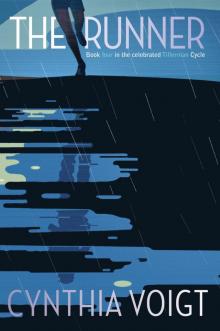 The Runner
The Runner By Any Name
By Any Name Bad Girls, Bad Girls, Whatcha Gonna Do?
Bad Girls, Bad Girls, Whatcha Gonna Do?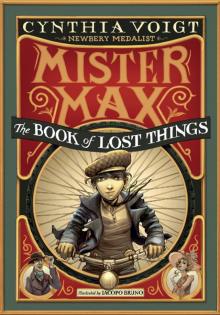 Mister Max: The Book of Lost Things: Mister Max 1
Mister Max: The Book of Lost Things: Mister Max 1 The Wings of a Falcon
The Wings of a Falcon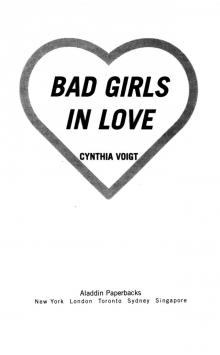 Bad Girls in Love
Bad Girls in Love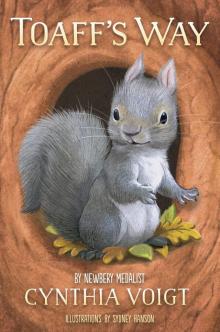 Toaff's Way
Toaff's Way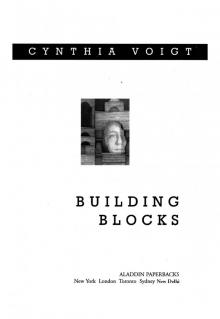 Building Blocks
Building Blocks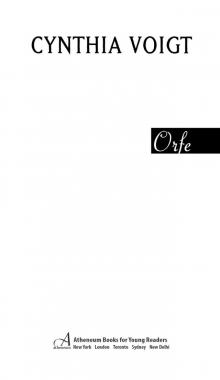 Orfe
Orfe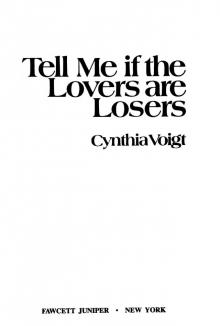 Tell Me if the Lovers Are Losers
Tell Me if the Lovers Are Losers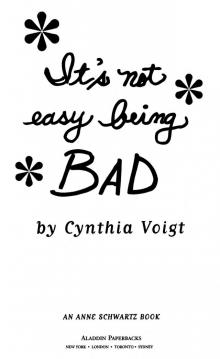 It's Not Easy Being Bad
It's Not Easy Being Bad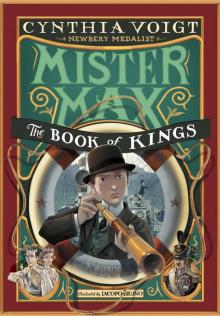 The Book of Kings
The Book of Kings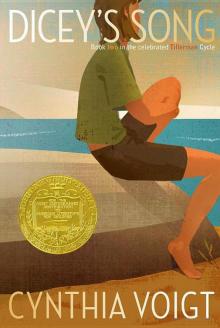 Dicey's Song
Dicey's Song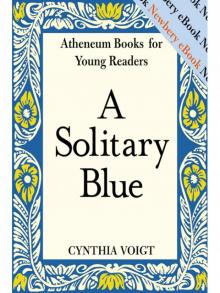 A Solitary Blue
A Solitary Blue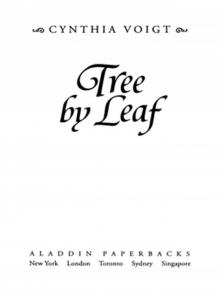 Tree by Leaf
Tree by Leaf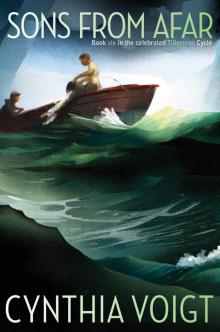 Sons From Afar
Sons From Afar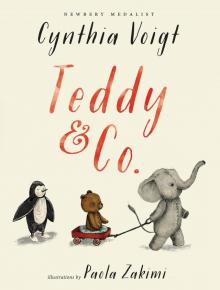 Teddy & Co.
Teddy & Co. Jackaroo
Jackaroo Elske
Elske Izzy, Willy-Nilly
Izzy, Willy-Nilly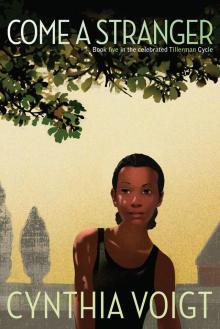 Come a Stranger
Come a Stranger Mister Max: The Book of Secrets: Mister Max 2
Mister Max: The Book of Secrets: Mister Max 2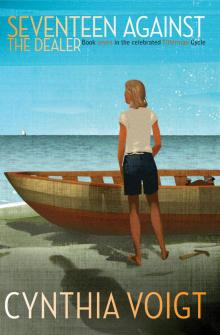 Seventeen Against the Dealer
Seventeen Against the Dealer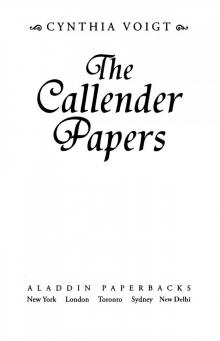 The Callender Papers
The Callender Papers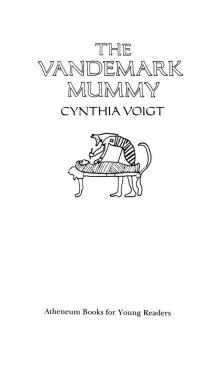 The Vandemark Mummy
The Vandemark Mummy Tale of Birle
Tale of Birle Glass Mountain
Glass Mountain The Tale of Oriel
The Tale of Oriel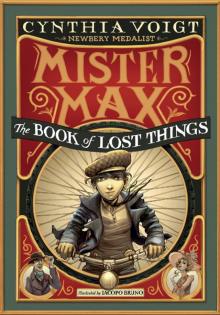 The Book of Lost Things
The Book of Lost Things The Book of Secrets
The Book of Secrets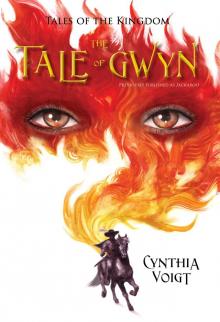 Tale of Gwyn
Tale of Gwyn